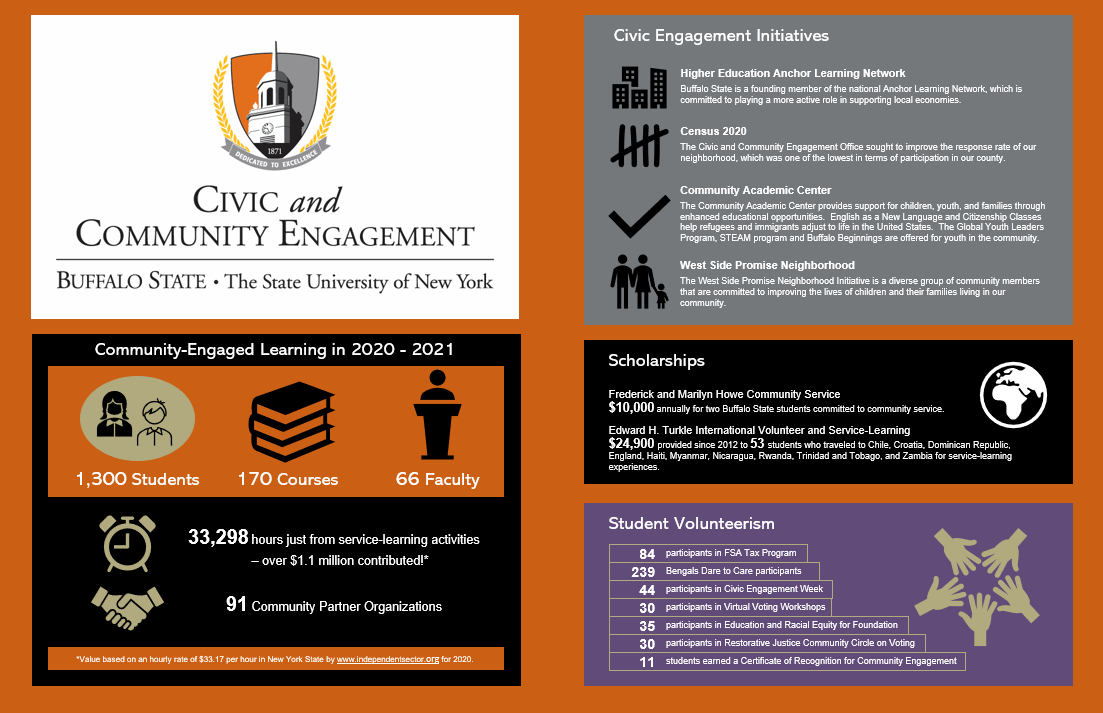
The office conducts a variety of assessments. Project outcomes have been significant and include:
The Civic and Community Engagement Office analyzed the four-year graduation rate of students enrolled as first-year students in Fall 2013. The cohort of 2,185 students was 25% more likely to graduate in four years if they had at least one service-learning course during their college career. Data was further analyzed to determine whether impacts were consistent across variables including incoming high school average, gender, and ethnicity.
Please learn more about our graduation and retention data.
A 9.3% higher retention rate was found for students enrolled in designated service-learning courses. Through analysis of 54,000 enrollment records for Buffalo State students enrolled between Spring 2014 and Fall 2016, return rates of students from one semester to the next were investigated. Additionally, end-of-semester student surveys reinforced a positive correlation between service-learning and retention with 57.8% of students agreeing/strongly agreeing with the statement, “My service-learning experience has made me more interested in staying at Buffalo State for the rest of my college career.”
Student comments included:
• "I feel as though with service-learning it broadened my perspective of Buffalo State overall, which is why it made me more interested in staying at Buffalo State."
• "My service-learning made me feel good that Buffalo State College offers things like this. It allows me to see things differently."
• "This experience has made me feel more connected with Buffalo State. This also made me value others."
Please learn more about our retention and graduation data.
Assessment is conducted on the impact of service-learning experiences on students’ ability to articulate insights into their own cultural values and biases and how these differ from those in the group(s) served in the service-learning experience. A 2018 survey found:
a 16% increase in a student's sense of social responsibility after participating in a service-learning course;
a 6% increase in students positively responding to the statement, “I make a difference in the community" after participating in a service-learning course.
Assessment is also conducted to determine the impact of service-learning on the development of skills identified as mediating factors for educational success (self-esteem, empowerment, prosocial behaviors, motivation, engagement, relationships, and sense of belonging). Buffalo State students exhibit improvements in skills, academic learning, and civic responsibility comparable to this national research.
We have provided additional results of the analysis conducted of the 2018 student pre-to post-assessment.
The office conducts annual surveys of community partners to determine how service-learning impacts and influences the partners, and how service-learning can continue to improve its goal of creating meaningful and impactful reciprocal partnerships. In a 2021 partner survey, 72% of partners indicated that the partnership impacted their organization in one or more positive ways, including improvements in meeting community needs, increases in the number of clients served, increases in the number of services offered, new ideas brought by students, and assistance in meeting the organization’s mission and goals. 97% of community partner respondents were satisfied with their service-learning partnerships, and 100% would work with a service-learning course again.
In 2018, faculty reported:
• 80% of faculty respondents agreed or strongly agreed with the statement, “Service-learning helps to fulfill Buffalo State's mission.”
• 80% of faculty agreed or strongly agreed with the statement, “Service-learning helps to achieve my departmental learning outcomes for students.”

An accessible and printable version of the Infographic is available.
Civic and Community Engagement
Some content on this page is saved in PDF format. To view these files, download Adobe Acrobat Reader free. If you are having trouble reading a document, request an accessible copy of the PDF or Word Document.
